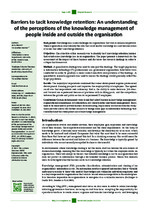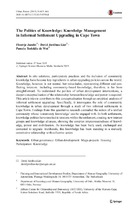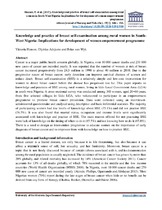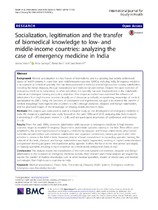Barriers to tacit knowledge retention: an understanding of the perceptions of the knowledge management of people inside and outside the organisation
Abstract
BACKGROUND: Knowledge loss causes challenges for organisations that wish to remain competitive. These organisations must identify the risks that could lead to knowledge loss and become aware of issues that affect knowledge retention.
OBJECTIVES: The objective of this research was to identify tacit knowledge retention barriers that could cause knowledge loss in an organisation. The paper presents a framework for the assessment of the impact of these barriers and discusses the research findings in order to critique that framework.
METHOD: A quantitative strategy was used to interpret the findings. The target population is information technology (IT) professionals in a government organisation. Interviews were conducted in order to produce a more context-sensitive interpretation of the findings. A quantitative research approach was used to ensure the findings would precisely reflect the target population.
RESULTS: The majority of respondents confirmed that career development requires professional
development, training prospects and improves the employability of employees. The agreed result was that respondents seek autonomy, that is, the ability to make decisions. Job stress and burnout are experienced because of problems with in filling posts, and the competition between the private and public sectors for experienced IT employees.
CONCLUSION: Certain determinants were found that affect barriers in knowledge management: organisational commitment, job satisfaction, job characteristics and talent management. These need to be measured to prevent barriers from occurring. Implications are drawn from the study; these provide a focus for further research to bridge some gaps in information technology that currently limit the widespread use of knowledge management.
Collections
Related items
Showing items related by title, author, creator and subject.
-
The politics of knowledge: Knowledge management in informal settlement upgrading in Cape Town
Jacobs, Floortje; Jordhus-Lier, David; Tsolekile de Wet, Pamela (Springer, 2015)t In situ solutions, participatory practices and the inclusion of community knowledge have become key ingredients in urban upgrading policies across the world. Knowledge, however, is not neutral, but value-laden, ... -
Knowledge and practice of breast self-examination among rural women in South-West Nigeria: Implications for development of women empowerment programme
Hanson, Victoria; Adejumo, Olyinka; van Wyk, Brian (UNISA Press, 2017)Cancer is a major public health concern globally. In Nigeria, over 10 000 cancer deaths and 250 000 new cases of cancer are recorded yearly. It was reported that the number of women at risk of breast cancer increased ... -
Socialization, legitimation and the transfer of biomedical knowledge to low- and middle-income countries: analyzing the case of emergency medicine in India
Sriram, Veena; George, Asha S.; Baru, Rama; Bennett, Sara (BMC, 2018)BACKGROUND: Medical specialization is a key feature of biomedicine, and is a growing, but weakly understood aspect of health systems in many low- and middle-income countries (LMICs), including India. Emergency medicine is ...




